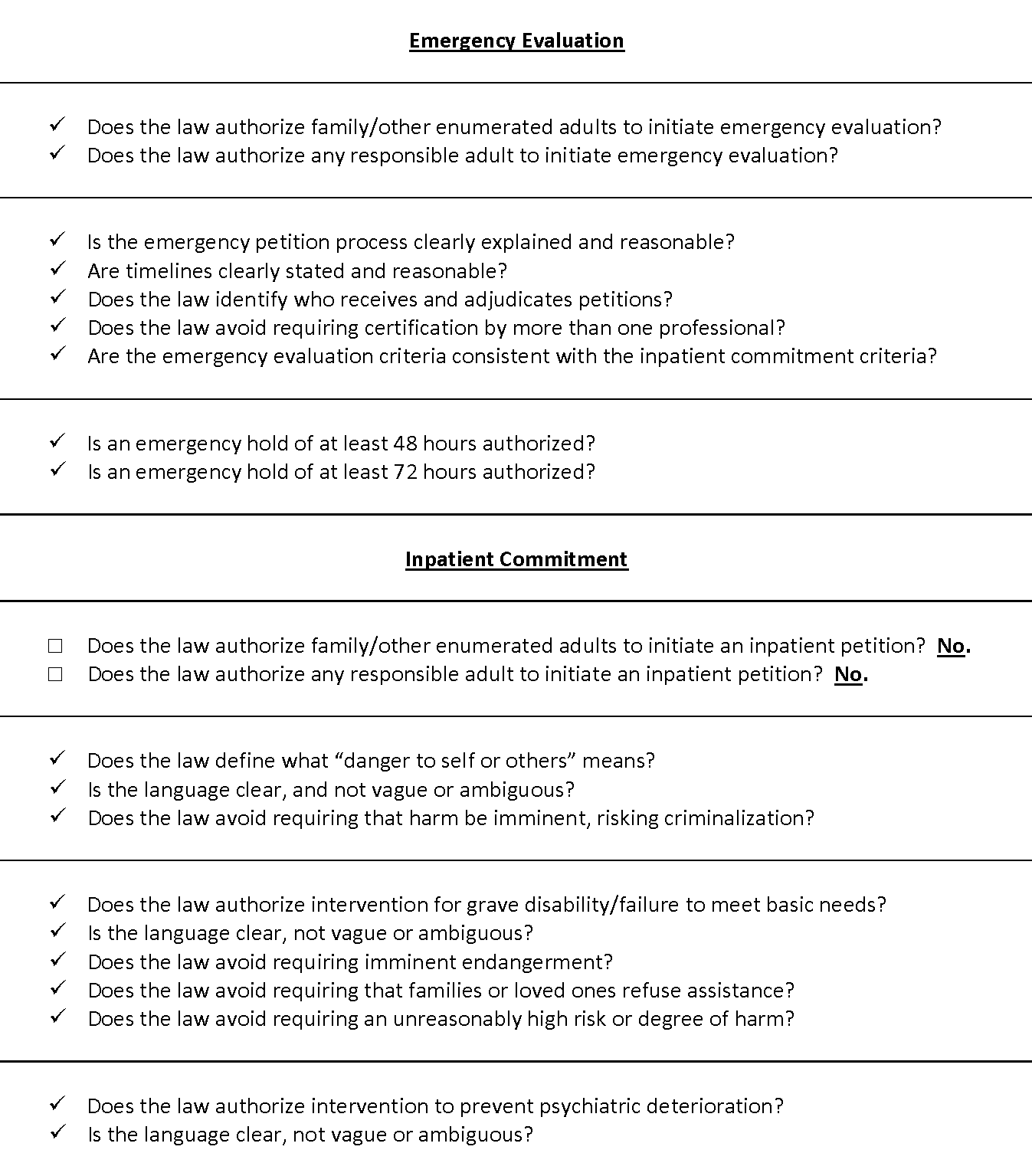Family Resources in Resources in Missouri
- Missouri Department of Mental Health (dmh.mo.gov) Resources and contacts
- NAMI Missouri (namimissouri.org) Support groups, training, information
- Disability Portal for State of Missouri (disability.mo.gov) Protection and advocacy for individuals with disabilities
- Missouri Housing Resources (dmh.mo.gov) Find housing and utility assistance by county
- Missouri Offender Search (web.mo.gov) Find offender by name or identification number
- The Missouri Bar (mobar.org) Legal Assistance
How many people in Missouri have SMI?
individuals with severe mental illness.
individuals with SMI who receive treatment in a given year.
of the adult population is estimated living with a SMI in the United States.
State psychiatric hospital beds in Missouri
2023 total beds: 890
- Civil beds: 0
- Forensic beds: 890
2023 beds per 100,000 people: 14.4
Click here for more information about state psychiatric hospital beds in Missouri.
A minimum of 50 beds per 100,000 people is considered necessary to provide minimally adequate treatment for individuals with severe mental illness. Missouri fails to meet this minimum standard.
For Additional Information
Data is a powerful tool to advocate for change. Curious about a specific data point in your state? Reach out to us at ORPA@treatmentadvocacycenter.org
Fast Facts on SMI in Missouri
Deinstitutionalization, outdated treatment laws, discriminatory Medicaid funding practices, and the prolonged failure by states to fund their mental health systems drive those in need of care into the criminal justice and corrections systems.
18%
6,399
890
7 to 1
2021 Missouri State Mental Health Agency's expenditures
Every state receives block grant funding from the federal government to provide mental health services to their community. Below is some information about how these dollars are spent and compares to other state spending.
$733,653,752
26%
$8,903
2.5%
Missouri's Treatment Laws
MO. ANN. STAT. § 632.305(1). An application for detention for evaluation and treatment may be executed by any adult person, who need not be an attorney or represented by an attorney, including the mental health coordinator, on a form provided by the court for such purpose, and shall allege under oath, without a notarization requirement, that the applicant has reason to believe that the respondent is suffering from a mental disorder and presents a likelihood of serious harm to himself or herself or to others. The application shall specify the factual information on which such belief is based and should contain the names and addresses of all persons known to the applicant who have knowledge of such facts through personal observation. MO. ANN. STAT. § 632.305(2). The filing of a written application in court by any adult person, who need not be an attorney or represented by an attorney, including the mental health coordinator, shall authorize the applicant to bring the matter before the court on an ex parte basis to determine whether the respondent should be taken into custody and transported to a mental health facility. The application may be filed in the court having probate jurisdiction in any county where the respondent may be found. If the court finds that there is probable cause, either upon testimony under oath or upon a review of affidavits, declarations, or other supporting documentation, to believe that the respondent may be suffering from a mental disorder and presents a likelihood of serious harm to himself or herself or others, it shall direct a peace officer to take the respondent into custody and transport him or her to a mental health facility for detention for evaluation and treatment for a period not to exceed ninety-six hours unless further detention and treatment is authorized pursuant to this chapter. Nothing herein shall be construed to prohibit the court, in the exercise of its discretion, from giving the respondent an opportunity to be heard. MO. ANN. STAT. § 632.305(3). A mental health coordinator may request a peace officer to take or a peace officer may take a person into custody for detention for evaluation and treatment for a period not to exceed ninety-six hours only when such mental health coordinator or peace officer has reasonable cause to believe that such person is suffering from a mental disorder and that the likelihood of serious harm by such person to himself or herself or others is imminent unless such person is immediately taken into custody. Upon arrival at the mental health facility, the peace officer or mental health coordinator who conveyed such person or caused him or her to be conveyed shall either present the application for detention for evaluation and treatment upon which the court has issued a finding of probable cause and the respondent was taken into custody or complete an application for initial detention for evaluation and treatment for a period not to exceed ninety-six hours which shall be based upon his or her own personal observations or investigations and shall contain the information required in subsection 1 of this section.
MO. ANN. STAT. § 632.330(2). Within ninety-six hours following initial detention, the head of the facility may file or cause to be filed either a petition for a twenty-one-day inpatient involuntary detention and treatment period or a petition for outpatient detention and treatment for a period not to exceed one hundred eighty days, provided he or she has reasonable cause to believe that the person is mentally ill and as a result presents a likelihood of serious harm to himself or herself or others. The court shall serve the petition and list of prospective witnesses for the petitioner upon the respondent and his or her attorney at least twenty-four hours before the hearing. MO. ANN. STAT. 632.350(5). At the conclusion of the hearing, if the court or jury finds that the respondent, as the result of mental illness, presents a likelihood of serious harm to himself or herself or to others, and the court finds that a program appropriate to handle the respondent’s condition has agreed to accept him or her, the court shall order the respondent to be detained for involuntary treatment in the least restrictive environment for a period not to exceed ninety days or for outpatient detention and treatment under the supervision of a mental health program in the least restrictive environment for a period not to exceed one hundred eighty days. MO. ANN. STAT. § 632.005(10). “Likelihood of serious harm” means any one or more of the following but does not require actual physical injury to have occurred: (a) A substantial risk that serious physical harm will be inflicted by a person upon his or her own person, as evidenced by recent threats, including verbal threats, or attempts to commit suicide or inflict physical harm on himself or herself. Evidence of substantial risk may also include information about patterns of behavior that historically have resulted in serious harm previously being inflicted by a person upon himself or herself; (b) A substantial risk that serious physical harm to a person will result or is occurring because of an impairment in his or her capacity to make decisions with respect to his or her hospitalization and need for treatment as evidenced by his or her current mental disorder or mental illness which results in an inability to provide for his or her own basic necessities of food, clothing, shelter, safety or medical care or his or her inability to provide for his or her own mental health care which may result in a substantial risk of serious physical harm. Evidence of that substantial risk may also include information about patterns of behavior that historically have resulted in serious harm to the person previously taking place because of a mental disorder or mental illness which resulted in his or her inability to provide for his or her basic necessities of food, clothing, shelter, safety or medical or mental health care; or (c) A substantial risk that serious physical harm will be inflicted by a person upon another as evidenced by recent overt acts, behavior or threats, including verbal threats, which have caused such harm or which would place a reasonable person in reasonable fear of sustaining such harm. Evidence of that substantial risk may also include information about patterns of behavior that historically have resulted in physical harm previously being inflicted by a person upon another person;


Recommended updates to treatment laws
- 1
Amend Mo. Ann. Stat. § 632.330(1) to authorize citizen right of petition for at least enumerated citizens, preferably any responsible adult, for inpatient commitment
- 2
Amend Mo. Ann. Stat. § 632.330(1) to authorize citizen right of petition for at least enumerated citizens, preferably any responsible adult, for outpatient commitment
- 3
Amend Mo. Ann. Stat. § 632.340 to require periodic reporting to the court
- 4
Amend Mo. Ann. Stat. § 632.335(1) to extend duration of continued outpatient order beyond 180 days
- 5
Adopt express procedures for the court to monitor uncontested AOT orders entered into voluntarily to give the benefit of the black robe effect to all enrollees
